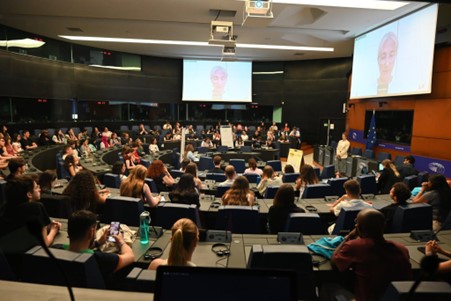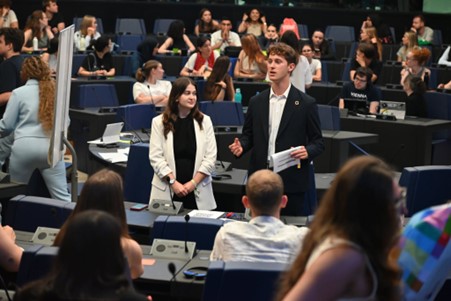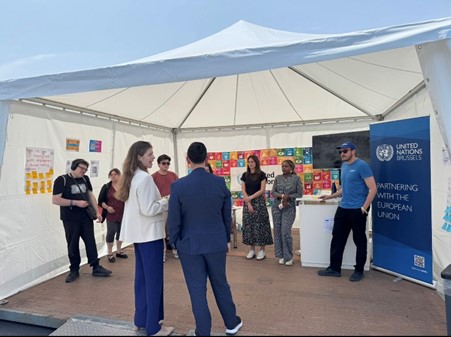On 13–14 June 2025, the European Parliament in Strasbourg hosted the European Youth Event (EYE), a flagship initiative that brings together thousands of young people from across Europe and beyond to exchange ideas and contribute to shaping EU policy.
This year's edition saw strong engagement from the UN Brussels Youth Task Force, including the International Telecommunication Union (ITU), which contributed both to youth-led content and to an interactive presence at the UN booth. As part of this effort, our Generation Connect Youth Envoy, Francisca Corralini, played an active role in designing and facilitating the UN workshop, alongside fellow members of the UN Youth Core Group—a diverse team of nine young representatives, each nominated by a participating UN agency. The session, titled “Ensuring Intergenerational Solidarity and Justice," was the result of a seven-month preparation process led by the Youth Core Group from January to July 2025. Together with agency focal points, the youth team co-developed the session format, thematic focus, and engagement activities to ensure the voices of young people were centred.
ITU played a key role in the process—not only contributing to the workshop's design and facilitation, with a strong focus on digital inclusion—but also by showcasing its Generation Connect initiative at the UN booth throughout the event. At the booth, ITU engaged directly with young participants, presenting current initiatives and pathways for young people to actively shape global digital policies through ITU platforms.
As part of the workshop, Generation Connect Europe Envoy, Francisca Corralini, co-developed and co-facilitated one of the three breakout rooms titled “Food for All, Connectivity Access for All: Bridging the Digital and Nutritional Divide." This session explored the intersection between digital access and food security, reflecting the complementary mandates of the International Telecommunication Union (ITU) and the Food and Agriculture Organization (FAO). With a focus on intergenerational justice, participants engaged in cross-sectoral discussions on how digital inclusion and equitable access to resources are vital to building fairer, more resilient societies. To deepen understanding, participants were assigned different generational identities and guided through structured prompts—an approach that encouraged them to consider perspectives beyond their own, including those of various age and social groups. This segment, facilitated with the involvement of ITU within the UN Task Force, placed a strong emphasis on digital skills and inclusion, aiming to raise awareness about both the challenges and opportunities of the digital divide in intergenerational contexts.
The session sparked valuable reflections and policy ideas, which will be compiled and shared with the European Commission as part of the consultation process for the forthcoming EU Strategy on Intergenerational Fairness. Reflecting on the workshop, Francisca shared: “The participants seemed truly interested and excited about the premise of what we are doing for the workshop as a whole—passing their policy ideas onto the people who can actually make them a reality—but also about what we were doing specifically for the digital inclusion discussion. “Overall, the engagement led to a fruitful debate on the reality of digital inclusion and what it means for it to be fair to everyone across every generation.
Throughout the European Youth Event, there was also a UN stand where Generation Connect and Generation Connect Youth Declaration was presented to young people, raising awareness about the initiative and engaging youth in discussions around digital inclusion and empowerment.
The European Youth Event offered an important platform for highlighting how digital inclusion intersects with broader social issues. Generation Connect's active involvement ensured that young people's voices and innovative ideas were brought to the forefront of these crucial discussions. The insights and experiences gathered in Strasbourg will feed into ongoing consultations and contribute to youth-informed recommendations, helping ensure that future digital policies are more inclusive and reflective of young people's perspectives.


